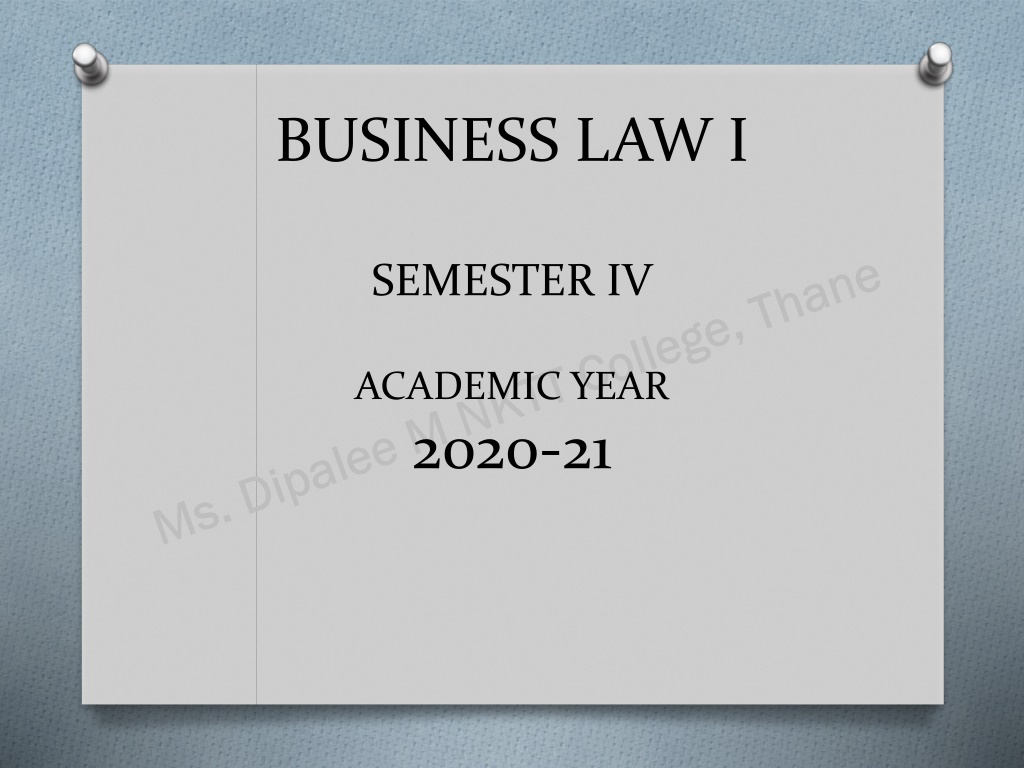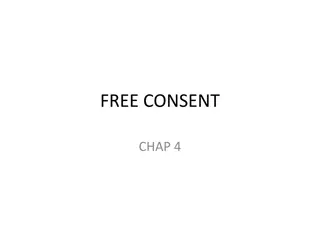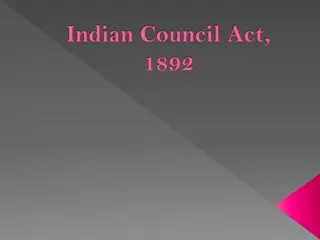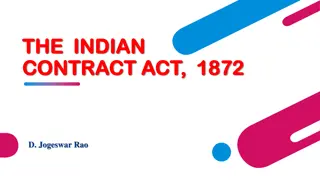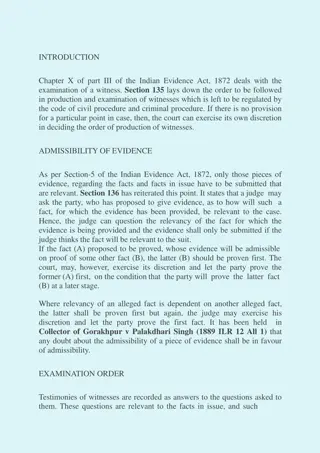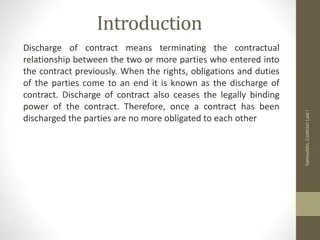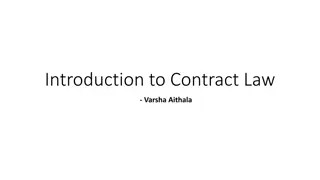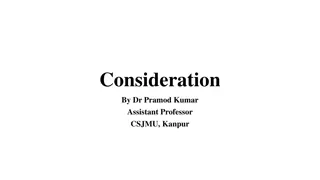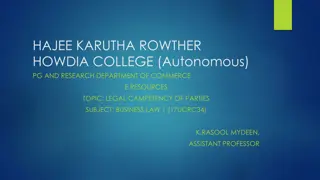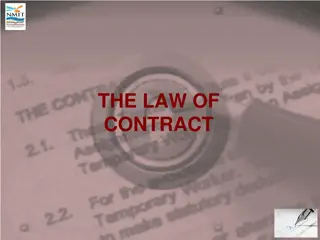Understanding Business Law: The Indian Contract Act 1872
Business law encompasses the rules and regulations governing trade, profession, and occupation. In the module covering The Indian Contract Act of 1872, the definition of a contract, its ingredients such as agreement, promise, and consideration, as well as examples of acceptance are explored. This act is crucial for commerce students to comprehend as it outlines the legal framework for transactions in businesses.
Download Presentation

Please find below an Image/Link to download the presentation.
The content on the website is provided AS IS for your information and personal use only. It may not be sold, licensed, or shared on other websites without obtaining consent from the author. Download presentation by click this link. If you encounter any issues during the download, it is possible that the publisher has removed the file from their server.
E N D
Presentation Transcript
BUSINESS LAW I SEMESTER IV ACADEMIC YEAR 2020-21
WHAT IS BUSINESS LAW O Law is a set of rules and regulations O Business word includes trade, profession and occupation. O So business law is rules and regulations to govern transactions involved in trade, occupation or profession O Being commerce student it is important to know what are the land laws that person involved in business should know.
MODULE I THE INDIAN CONTRACT ACT 1872
CONTRACT DEFINITION O Section 2 (h) Contract is an agreement Contract is an agreement enforceable by law enforceable by law
Ingredients of contract OAgreement Agreement OEnforceability Enforceability
Agreement O Section 2 (C) Every promise and every set of Every promise and every set of promises forming consideration for promises forming consideration for each other is an agreement each other is an agreement
Ingredients OPromise Promise OConsideration Consideration
Promise O Section 2 (b) A proposal when accepted A proposal when accepted becomes promise becomes promise
Ingredients OProposal Proposal OAcceptance Acceptance
Proposal O Section 2 (a) When one person signifies another, his willingness to do or to abstain from doing something, with a view to get assent of that other to such act or abstinance, he is said to make proposal.
Examples ?
Acceptance O Section 2(b) A proposal when accepted A proposal when accepted becomes promise . becomes promise .
Examples ?
Essentials to give valid Proposal or Rules to make valid offer
1. Clear and definite O Words used should not be vague. O An offer must be definite and clear, if the terms of an offer are not definite and clear, it cannot be called a valid offer. If such offer is accepted it cannot create a binding contract.
Examples A has two motorcycles. He offers B to sell one motorcycle for Rs.27,000. It is not a valid offer because it is not clear that which motor cycle A wanted to sell.
2. It must create legal relation: OThe offer must be made in order to create legal relations otherwise, there will be no agreement. If an offer does into give rise to legal obligations between the parties it is not a valid offer in the eye of law.
Examples O 1. A invites B to dinner B accept the invitation. It does not create any legal relations, so there is no agreement. O 2. A offers to sell his watch to B for Rs.200 and B agrees. There is an agreement because here the parties intend to create legal relations.
It must be communicated to the offeree: O An offer is effective only when it is communicated to the offeree. If an offer is not communicated to the offeree it cannot be accepted. Thus an offer, which is not communicated, is not a valid offer. It applies to both specific and general offers.
Example O A without knowing that a reward has been offered for the arrest of a particular criminal, catches the criminal and informs the police. A cannot recover the reward as he was not aware of it.
Case Study: Lalman Shukla Vs. Gauri Datt
4. It may be express or implied: O An offer may be made either by words or by conduct. An offer, which is made by words spoken or written, is called an express offer. O The offer, which is made by the conduct of a person, is called an implied offer.
Examples O1. M says to N that he will sell his motorcycle to him for Rs.40,000. It is an express offer. O2. A railway coolie carries the luggage of B without being asked to do so B allows him to do so. It is an implied offer.
5. It may be specific or general: O When an offer is made to a specified person or group of persons, it is called specific offer. Such an offer can be accepted only by the person or persons to whom it is made. O A general offer, on the other hand, is one, which is made to public in general and it may be accepted by any person who fulfils the conditions mentioned in it. Both specified and general offers are valid.
Examples O M makes an offer to N to sell his bicycle for Rs.800, it is a specific offer. In this case, only N can accept it. 2. A announces in a newspaper a reward of Rs.1,000 for any one who will return his lost radio. It is general offer.
It mat be express or implied O An offer may be made either by words or by conduct. O An offer, which is made by words spoken or written, is called an express offer. O The offer, which is made by the conduct of a person, is called an implied offer.
Examples 1. M says to N that he will sell his motorcycle to him for Rs.40,000. It is an express offer. 2. A railway coolie carries the luggage of B without being asked to do so B allows him to do so. It is an implied offer.
Conditional Offer O . . An offeror may attach any terms and conditions to the offer he makes. He may even prescribe the mode of acceptance. There is no contract, unless all the terms of the offer are accepted in the mode prescribed by the offeror.
Example O A asks B to send the reply of his offer by telegram but B sends reply by letter, A may reject such acceptance because it is opposed to the prescribed mode of communication.
Cross offers: OWhen two parties make similar offers to each other, in ignorance of each other s such offers are called cross-offers. acceptance of cross-offers does not result agreement. The in complete
Example O On 23rdDecember 2007, A wrote B to sell him 100 ton of iron at Rs.10,000 per ton. On the same day, B wrote to A to buy 100 tons of iron at Rs.10,000 per ton. There is no contract between A & B because the offers wee similar and made in ignorance of the other and so there is no acceptance of each other s offer.
counter offer O It is a new offer in place of original offer. When counter offer is given, original offer automatically gets cancelled. On giving such offer, offeror becomes offeree and offeree becomes offeror.
Case Law Hyde Vs. Wench O Facts Wrench offered to sell his farm in to Hyde for 1000,Hyde offered 950, and after examining the offer Wrench refused to accept, and informed Hyde. Hyde agreed to buy the farm for 1000, but Wrench refused to sell the farm to him he sued for breach of contract. it was held that There was no contract. Where a counter offer is made this destroys the original offer so that it is no longer open to the offeree to accept
Acceptance Section 2(b)
Definition OAccording to Section 2(b), "When the person to whom the proposal signifies his assent thereto, the proposal is said to be accepted." is made
Essentials/Rules to make valid acceptance
Acceptance must be given by the person to whom the proposal is made OAn acceptance acceptance to be valid must be given only by a person to whom offer has been given. In other words, acceptance must move from the offeree and no one else.
Acceptance can be given only when the acceptor has the knowledge of the offer OAcceptance therefore cannot be given without the knowledge of offer, as in case of Lalman Shukla v Gauri Dutt.
. The acceptance must be absolute and unconditional O It is another important essential element of a valid acceptance. A valid contract arises only if the acceptance is absolute and unconditional. It means that the acceptance should be in total (i.e. of all the terms of the offer), and without any condition. O Thus, an acceptance with a variation is no acceptance. It is simply a counter offer. A counter offer puts an end to the original offer, and it cannot be revived by subsequent acceptance.
The acceptance must be given within the time prescribed or within a reasonable time O Sometimes, the time limit is fixed within which an acceptance is to be given. In such cases, the acceptance must be given within the fixed time limit. In case, no time is prescribed, the acceptance should be given within a reasonable time. The term reasonable time depends upon the facts and circumstances of each case.
The acceptance must be given before the lapse of offer O A valid contract can arise only when the acceptance is given before the offer has elapsed or withdrawn. An acceptance which is made after the withdrawal of the offer is invalid, and does not create any legal relationship.
The acceptance must be communicated O It is an important and essential element of a valid acceptance. The definition of acceptance as given in Sec. 2(b) emphasises this requirement. According to this, the consent to the offer should be signified (i.e. indicated or declared).
Implied acceptance O Case Law: Carbolic Smoke Ball Company V/s Ms. Carlill O Printed on box of Smoke balls that whoever consumes as per printed directions and get Influenza will be rewarded O Ms Carlill did so and contacted with Influeanza O Company contended she did not communicated her acceptance. O Court held that by consuming she gave implied acceptance.
